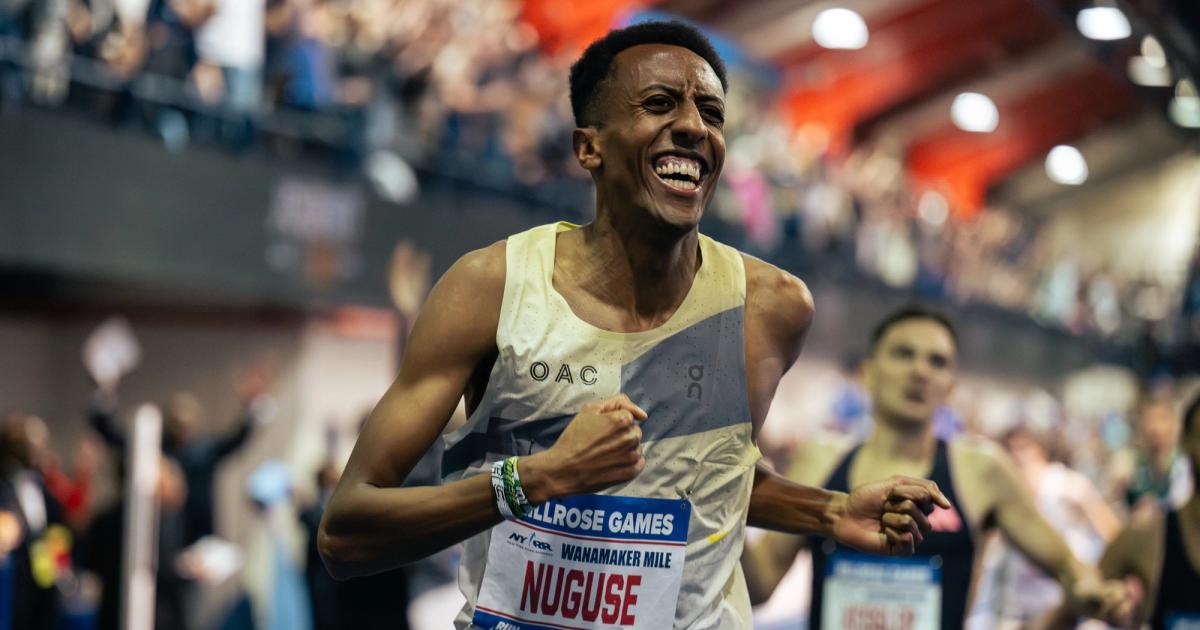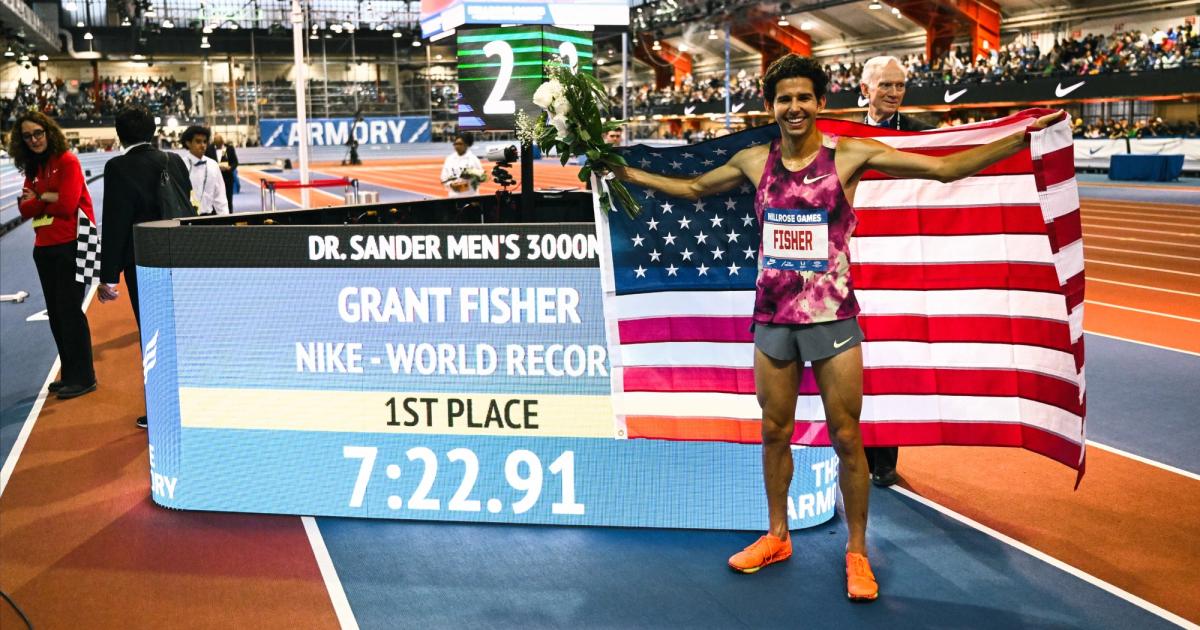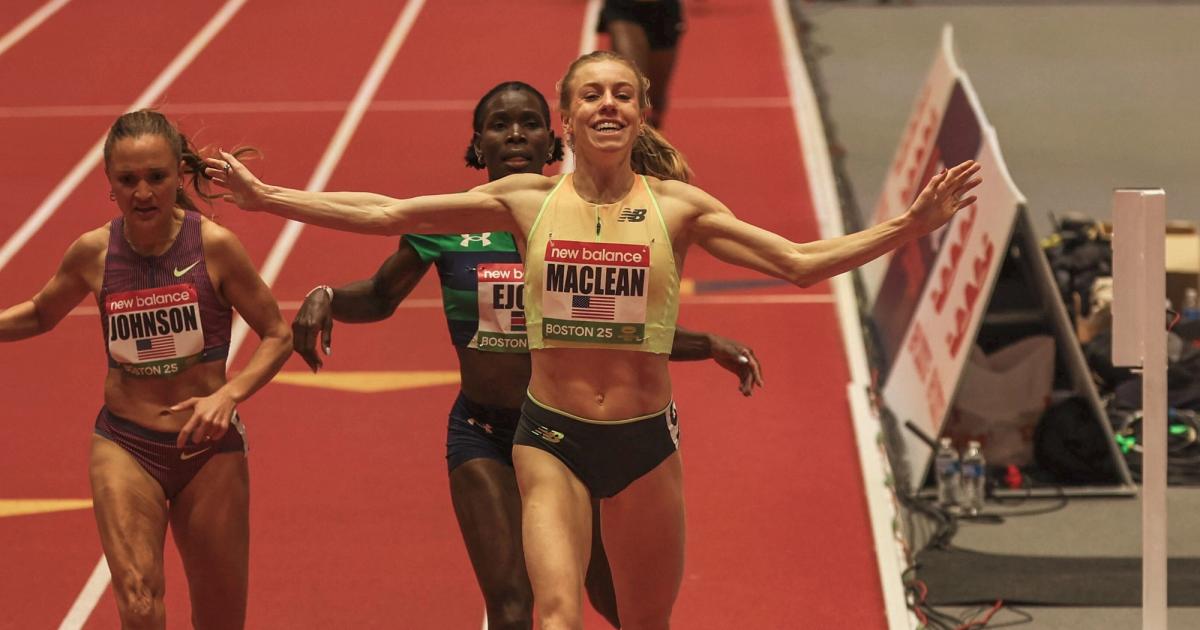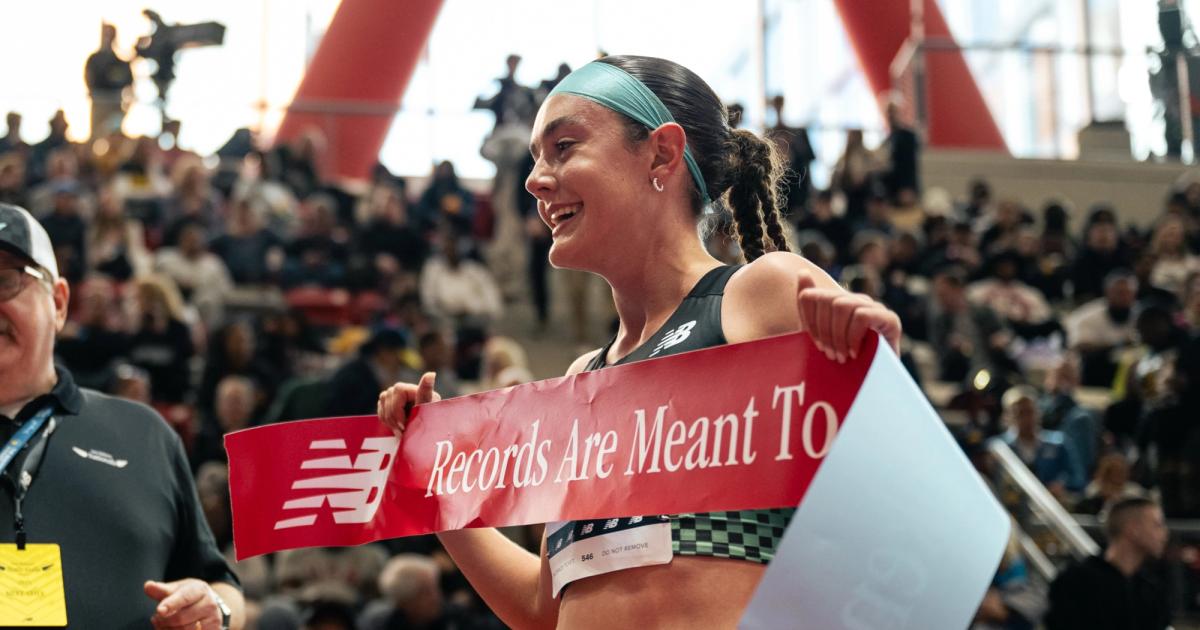By David Melly
February 12, 2025
There are few sporting events in the world that never seem to disappoint, and this weekend, the Millrose Games delivered once again. With all due respect to the Big Football Game in New Orleans, the Big Track Meet in New York was the most exciting two hours of athletics all weekend.
The big takeaways can be condensed into a record rundown: two world indoor records (mile and 3000m), two age-group records (middle-school 60m and U20 mile), three American records, a trio of U.S. high school records, and another ten or so national records. But that doesn’t tell the whole story.
It’s easy to peruse the little annotations by the results and assume that every fast race was a war of attrition strung out by a top-tier pacemaker towing a single-file line of athletes with only PBs on their minds. But at this year’s Millrose, those times were the result of some seriously great head-to-head racing. The slugfest between Grant Fisher and Cole Hocker provided drama and surprises at every banked turn—if DraftKings had half as many prop bets for this meet as the Super Bowl, you could’ve gotten great odds on “Hocker takes the lead from three laps out” or “Grant Fisher passes in the final 50 meters.”
Speaking of long odds, there was certainly a lot of world record talk prior to the men’s Wanamaker Mile. But not many people would’ve bet big on “Hobbs Kessler runs sub-3:47 but doesn’t win the race,” especially after pre-race favorite Josh Kerr withdrew from the meet with an illness. But such is life when Yared Nuguse is on the track at the Armory, as he became the first-ever 3:46 man indoors en route to his third straight title. And thank goodness Gary Martin’s entry time of 3:54.94 was good enough to sneak him into the back half of the field, because just like his beloved Eagles, he exceeded even the highest of expectations. Martin knocked six seconds off his PB, running 3:48.82 to leapfrog from #20 to #2 on the NCAA all-time list. (There had to have been at least one drunken reveler on Sunday night scampering up a greased pole in Center City specifically in Gary’s honor, right?)
Even when distance events didn’t deliver a world-record performance, the battles up front still made for thrilling races. Georgia Bell navigated a stellar Wanamaker Mile field of her own to out-lean and outduel Nikki Hiltz and Heather MacLean. In a race where half a second separated first and fifth place, Bell put on a tactical masterclass, riding MacLean’s slipstream to the front when the American made her move then saving one last gear for the final turn to pass then hold off all challengers.
In the women’s 3000m, the big takeaway wasn’t just the outcome but its implications for the year to come. Whittni Morgan picked up her second win in as many weeks, following her 14:48.41 5000m at BU with an 8:28.03 3000m at Millrose over fellow American Josette Andrews. Where things really got interesting was how it played out. Morgan, a former NCAA cross country champ, blew past Andrews, a sub-four 1500m runner, in the final lap, closing in a blistering 28.93. Morgan is no slouch when it comes to speed—she was a two-time All-American in the 1500m—but that kind of kick suggests she’s tapping into a new depth of fitness that could make her very, very dangerous in championship settings.
Close finishes were something of a theme across the men’s races: Josh Hoey triumphed over World Indoor champion Bryce Hoppel in the 800m and became the new American record holder in the process. Unheralded sprinter Marcellus Moore took down Trayvon Bromell by a stride in the 60m dash (6.56 to 6.59). And Dylan Beard defended his Millrose hurdles title over Cordell Tinch in world-leading, personal best fashion with a 7.38 victory.
The women’s races, on the other hand, were all about making a statement. Jacious Sears (7.02 in the 60m), Masai Russell (7.76 in the 60H), Alexis Holmes (51.21 in the 400m), and Shafiqua Maloney (1:59.07 in the 800m) all took decisive and unambiguous victories over strong fields, sending the message loud and clear that, if they make the trip to World Indoors in Nanjing, they’re not flying across the Pacific to finish second.
The 117th edition of the Millrose Games really was the best of both worlds, and proof of a very important concept for the long term prospects of the sport: mind-bogglingly fast running and juicy head-to-head racing aren’t mutually exclusive. When setting the stage for both, sure, it helps to have the prestige and funding of a televised, sponsor-heavy meet with a century of history behind it, but it is possible outside of a championship setting.
A big part of it is setting the right narrative. The pre-meet coverage of Millrose had a smattering of world record chatter, to be sure, but the bulk of the table-setting for the meet was focused around the strong, balanced fields: Hocker vs. Fisher, Nuguse vs. Kerr, a stacked women’s hurdles, and a wide-open women’s Wanamaker. Compare that with the teasers promoting tomorrow’s Meeting d'Athlétisme in Lievin, where we’ve known for months Jakob Ingebrigtsen and Gudaf Tsegay will be targeting world records but, until a few days ago, we didn’t even know who they’d be racing.
Watching an athlete achieve something no one else has ever done is one of the great parts of track and field fandom, but it can create a false dichotomy that can be unhelpful. If we start judging every race by the metric of “world record” vs. “no world record,” we set an astronomically high standard of success that can tarnish an otherwise-incredible viewing experience.
We can have it all. Producing and celebrating fast times is an admirable goal for any meet. Athletes can and should set big goals and call their shots for fans to follow along. But when a world record attempt fizzles, ensuring that rivalries, underdogs, upsets, and comebacks are just as integrated into the package of goods being sold provides a strong, durable foundation that helps guarantee a satisfying viewing experience regardless of the numbers next to each result.

David Melly
David began contributing to CITIUS in 2018, and quickly cemented himself as an integral part of the team thanks to his quick wit, hot takes, undying love for the sport and willingness to get yelled at online.




